BMW iX1 VS VW ID. Buzz Transporter
BMW iX1
The BMW iX1 stands out as a versatile addition to the electric vehicle market, seamlessly combining compact dimensions with advanced electric technology. Its sophisticated design elements and premium interiors ensure a luxurious driving experience, while the vehicle's performance focuses on delivering both efficiency and agility. With enhanced connectivity features and an emphasis on sustainability, this model represents a significant step forward in BMW's commitment to a greener future.
more informationVW ID. Buzz Transporter
The VW Nutzfahrzeuge ID. Buzz Transporter represents a bold leap into the future with its innovative electric design and retro-inspired aesthetic. Combining practicality with modern technology, it offers a spacious interior and advanced connectivity features ideal for both urban and long-distance journeys. This vehicle stands as a testament to Volkswagen's commitment to sustainability and forward-thinking mobility solutions.
more information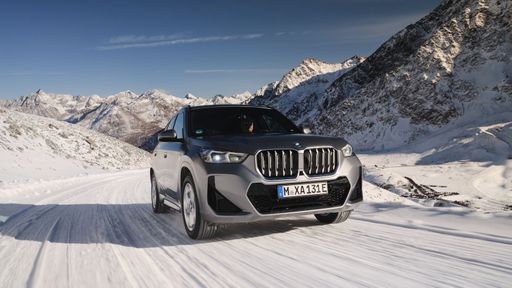 @ press.bmwgroup.com
@ press.bmwgroup.com
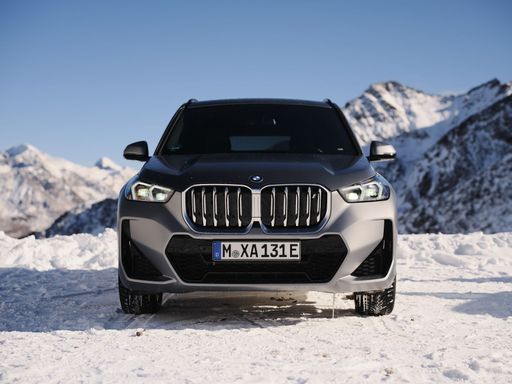 @ press.bmwgroup.com
@ press.bmwgroup.com
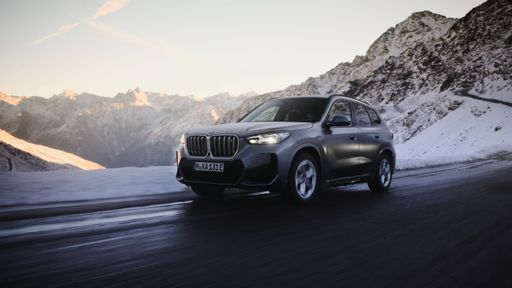 @ press.bmwgroup.com
@ press.bmwgroup.com
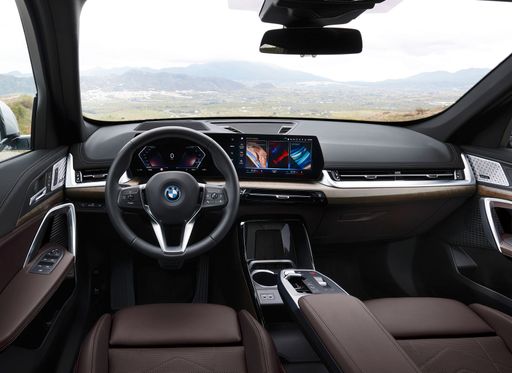 @ press.bmwgroup.com
@ press.bmwgroup.com
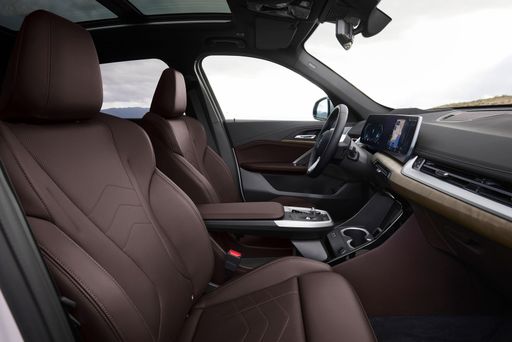 @ press.bmwgroup.com
@ press.bmwgroup.com
Costs and Consumption |
|
|---|---|
|
Price
about 41500 - 54100
£
|
Price
about 43600 - 51400
£
|
|
Consumption L/100km
-
|
Consumption L/100km
-
|
|
Consumption kWh/100km
15.8 - 17.1
kWh
|
Consumption kWh/100km
19.2 - 20.3
kWh
|
|
Electric Range
436 - 463
km
|
Electric Range
432 - 461
km
|
|
Battery Capacity
64.8
kWh
|
Battery Capacity
59 - 79
kWh
|
|
co2
0
g/km
|
co2
0
g/km
|
|
Fuel tank capacity
-
|
Fuel tank capacity
-
|
Dimensions and Body |
|
|
Body Type
SUV
|
Body Type
Cargo Van
|
|
Seats
5
|
Seats
3
|
|
Doors
5
|
Doors
4
|
|
Curb weight
1940 - 2085
kg
|
Curb weight
2264 - 2510
kg
|
|
Trunk capacity
490
L
|
Trunk capacity
-
|
|
Length
4500
mm
|
Length
4712
mm
|
|
Width
1845
mm
|
Width
1985
mm
|
|
Height
1616
mm
|
Height
1932
mm
|
|
Payload
495
kg
|
Payload
640 - 753
kg
|
Engine and Performance |
|
|
Engine Type
Electric
|
Engine Type
Electric
|
|
Transmission
Automatic
|
Transmission
Automatic
|
|
Transmission Detail
Reduction Gearbox
|
Transmission Detail
Reduction Gearbox
|
|
Drive Type
Front-Wheel Drive, All-Wheel Drive
|
Drive Type
Rear-Wheel Drive, All-Wheel Drive
|
|
Power HP
204 - 313
HP
|
Power HP
170 - 340
HP
|
|
Acceleration 0-100km/h
5.6 - 8.6
s
|
Acceleration 0-100km/h
-
|
|
Max Speed
170 - 180
km/h
|
Max Speed
160
km/h
|
|
Torque
250 - 494
Nm
|
Torque
310 - 679
Nm
|
|
Number of Cylinders
-
|
Number of Cylinders
-
|
|
Power kW
150 - 230
kW
|
Power kW
125 - 250
kW
|
|
Engine capacity
-
|
Engine capacity
-
|
|
Top speed
170 - 180
km/h
|
Top speed
160
km/h
|
General |
|
|
Model Year
2022 - 2023
|
Model Year
2024
|
|
CO2 Efficiency Class
A
|
CO2 Efficiency Class
A
|
|
Brand
BMW
|
Brand
VW
|
BMW iX1
A New Era of Innovation: Meet the BMW iX1
The automotive world has seen a seismic shift towards sustainability and electrification, and BMW has solidified its place in this evolution with the introduction of the BMW iX1. As a fully electric SUV, the iX1 serves as a testament to how luxury, performance, and eco-consciousness can harmoniously blend in the modern automotive landscape.
Exquisite Design Meets Purposeful Engineering
The BMW iX1 is not just an electric vehicle; it's an embodiment of cutting-edge design and technology. With its bold SUV silhouette, the iX1 boasts dimensions of 4500 mm in length, 1845 mm in width, and 1616 mm in height, providing a spacious yet agile presence on the road. Its dynamic aesthetic is complemented by an aerodynamic form that enhances efficiency, offering a drag coefficient that rivals traditional SUV models.
Powertrain and Performance Specifications
Beneath the hood of the BMW iX1 lays an electric motor that signifies the future of automotive engineering. Available variants offer power outputs ranging from 204 to 313 PS (150 to 230 kW). The iX1 comes with either a front-wheel or all-wheel drivetrain, catering to different driving preferences. The xDrive30 variant, in particular, features all-wheel drive, delivering up to 313 PS for those who crave enhanced traction and control.
With a commendable electric consumption of 15.8 to 17.1 kWh per 100 km, the iX1 strikes a fine balance between power and efficiency. Its acceleration stats are equally impressive, with the ability to go from 0-100 km/h in as little as 5.6 seconds. This ensures that while it's eco-friendly, it does not compromise on the exhilaration factor. The vehicle can reach a top speed range between 170 and 180 km/h.
A Journey Without Interruptions: Range and Battery Life
The iX1's battery, boasting a capacity of 64.8 kWh, provides a substantial driving range of 436 to 463 km on a single charge, depending on the variant. This means long road trips are not only feasible but enjoyable, eliminating the range anxiety often associated with electric vehicles.
Comfort and Technological Interior
Inside, the iX1 exemplifies BMW’s commitment to luxury and innovation. It’s a five-seater SUV designed with comfort at its forefront, featuring advanced technological interfaces that enrich the driving experience. The spacious cabin offers 490 litres of boot space, ensuring practicality without sacrificing style.
In terms of monthly costs, owning an iX1 can range between €1,147 and €1,453, considering the zero-emission appeal with a CO2 efficiency class of A.
The Financial Aspect of Sustainability
With a price range from €48,400 to €63,140, the BMW iX1 isn't just a vehicle—it's an investment in sustainable motoring. Factoring in a cost of around 45.9 to 58.1 cents per kilometre, the iX1 offers an economically viable option for the eco-conscious driver.
Conclusion: The Future Is Now
The BMW iX1 stands as a beacon of what the future holds for zero-emission vehicles. With a melding of sustainability, performance, and luxury, it's not just a car, but a glimpse into the next chapter of automotive history.
VW ID. Buzz Transporter
Reimagining the Classic: The VW ID. Buzz Transporter
The automotive industry has recently been inundated with a range of electric vehicles (EVs), but few can claim a lineage as iconic as the Volkswagen ID. Buzz Transporter. A modern-day reimagining of the classic VW Microbus, the ID. Buzz Transporter seamlessly blends nostalgia with cutting-edge technology and sustainable performance.
Power Meets Precision: Performance and Efficiency
Available in multiple configurations, the ID. Buzz Transporter offers both rear-wheel drive and all-wheel drive options. The base model features an impressive 286 horsepower and a respectable electric range of 461 km, thanks to its 19.2 kWh consumption per 100 km. For those who crave more power, the all-wheel-drive model ups the ante with a thrilling 340 horsepower and a range of 432 km, facilitated by its slightly higher 20.3 kWh/100 km consumption.
Both versions rely on an efficient reduction gearbox, ensuring a smooth and automatic driving experience. The rear-wheel-drive's entry-level model provides a more accessible point for EV enthusiasts with 170 horsepower and an overall easier handling package.
The Heart of an Electric Revolution: Battery and Range
Power comes from robust battery configurations that reflect VW's commitment to sustainable performance. The ID. Buzz Transporter boasts a 79 kWh battery in its higher-end models, allowing expansive commutes or work-related travels. Meanwhile, the 59 kWh option offers a reduced footprint, without substantially compromising on performance, to align perfectly with its more entry-level 170 HP variant.
Functional Innovation: Design and Practicality
While the exterior design pays homage to its retro predecessor, the four-door ID. Buzz is all about embracing modern interior design. The cargo van accommodates up to three seats, making it not only a style statement but a practical choice for businesses needing a workhorse with a zero-emission output.
Weighing in at a curb weight range from 2264 kg to 2510 kg, depending on the model chosen, the vehicle is a testament to Volkswagen's focus on durability and reliability. Despite its weight, the ID. Buzz delivers a payload ranging from 640 kg to 753 kg, maintaining crucial cargo efficiency.
Sustainability Meets Technology: Features and Future Outlook
Volkswagen intentionally integrated forward-thinking technology into the ID. Buzz, emphasizing zero emissions with a CO2 rating of 0 g/km and maintaining an A-grade CO2 efficiency class. These advancements, paired with a maximum speed of 160 km/h and an impressive torque (ranging from 310 Nm to 679 Nm based on the selected variant), set a new standard for electric utility vehicles.
Conclusion: A Symbol of Tomorrow, Today
The ID. Buzz Transporter signifies VW's earnest step into the future while paying homage to its rich heritage. Priced between €50,825 and €59,922, the vehicle caters to a range of consumers looking for a versatile and eco-friendly solution without sacrificing quality or style. With its innovative engineering and nostalgic charm, the ID. Buzz Transporter is poised to capture the imagination of both traditional VW fans and new EV adopters in 2024.
